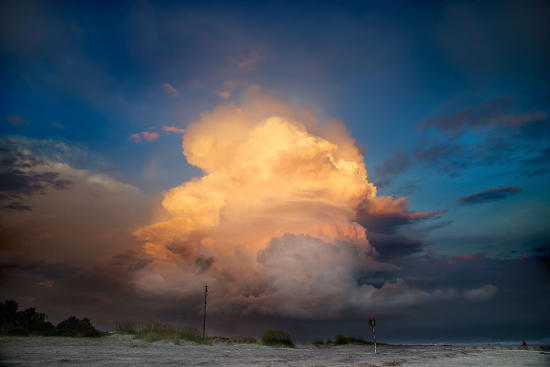A Pepper Grinder Post
In the Gap
In The Art of Compromise part1 and part 2, we looked at Aaron's attempts to use compromise and spin to keep people happy in Exodus 32. However, we skipped over a section in the middle of chapter 32, part of which I want to look at today.
As you read the passage below, I want you to try to put yourself in the place of Moses. Moses had been trying to lead the nation of Israel from Egypt to the Promised Land. Although God did some amazing things, the Israelites were not easy to lead. They were prone to complaining and grumbling, and quick to place blame on Moses. They even moaned that they wished they had never left their position of servitude in Egypt. To cap it all off, while Moses was on Mount Sinai receiving the Ten Commandments and other parts of the law of God, the people turned to blatant idolatry and started throwing a party. Here is the interchange between Moses and God that took place at this time (Exodus 32:7-14, my translation):
And Yahweh said to Moses, "Go down, because the people you brought up from Egypt have become corrupt. They have quickly turned aside from what I commanded, and have made themselves a metal bull, and have bowed down to it, and offered sacrifices to it. And they have said, 'These are your gods, Israel, who brought you up from Egypt.'"
And Yahweh said to Moses, "I have seen these people, and they're stubborn. Now leave me alone so my anger can burn against them, and I can destroy them, and I'll make you into a great nation."
But Moses sought the favor of Yahweh his God and said, "Yahweh, why should your anger burn against your people, whom you brought out of Egypt with mighty power and a strong hand? Why should the Egyptians say, 'It was for evil that he brought them out, to kill them in the mountains, and wipe them off the face of the earth?' Turn from your burning anger and don't bring disaster on your people. Remember your servants, Abraham, Isaac, and Israel, to whom you swore by yourself, saying, 'I will make your descendants as numerous as the stars of heaven. I will give all this land I promised to your offspring, and it will be their eternal inheritance.'"
Then God relented from bringing the disaster he had said he would bring on his people.
 To me, it sounds like the offer made to Moses was a pretty good one. Moses would be rid of the people who had been making his life miserable, and God would form a new nation from Moses. The children of Abraham, Isaac, and Jacob would be replaced by the children of Moses. The future land of Israel would instead be the land of Moses. It seems like Moses had everything to gain and not much to lose. All he had to do was say something like, "You are the righteous judge, you must do what you think best." All Moses had to do was to adopt a humble and submissive attitude toward God (which seems like it would have been a natural for him, since we are told in Numbers 12:3 that Moses was more humble than anyone else on earth).
To me, it sounds like the offer made to Moses was a pretty good one. Moses would be rid of the people who had been making his life miserable, and God would form a new nation from Moses. The children of Abraham, Isaac, and Jacob would be replaced by the children of Moses. The future land of Israel would instead be the land of Moses. It seems like Moses had everything to gain and not much to lose. All he had to do was say something like, "You are the righteous judge, you must do what you think best." All Moses had to do was to adopt a humble and submissive attitude toward God (which seems like it would have been a natural for him, since we are told in Numbers 12:3 that Moses was more humble than anyone else on earth).
But Moses didn't do that. He argued with God. He pointed out that destroying the Israelites would be bad for God's image in the eyes of the Egyptians, and he reminded God of his promises to Abraham, Isaac, and Jacob (also known as Israel) to make their descendants as numerous as the stars in the sky, and to give them the land of Israel. And God listened to him! Even more surprising to me was that when God told Moses what he was planning to do, he said, "Now leave me alone so my anger can burn against them, and I can destroy them, and I'll make you into a great nation." It seems as though the God who created the universe had to get Moses's permission to do what he wanted to do. What in the world is going on here?
I'd like to look at a verse in Ezekiel that sheds some light on this. Here is my translation of Ezekiel 22:30:
I looked for a man among them to fill the gap in the wall, and to stand in the breach before me on behalf of the land, so I wouldn't destroy it, but I found no one.
It helps to understand what was said before this point in the book of Ezekiel. God has spent chapter after chapter accusing his people of flagrant rebellion against him. Two main things stand out:
- The people of Israel have failed to follow God's law and have worshipped idols with abandon.
- The people have freely indulged in murder, oppression, and mistreatment of others, including people like widows and orphans, who have no power to resist.
And here is an outline of the major themes of the verses leading up to the one quoted above from chapter 22:
- God promised to make his people into an object of scorn because of their sins of idolatry and bloodshed.
- God gave a laundry list of all the wicked things the Israelites had done, both against God and against people.
- God promised to disperse his people among the nations and make them dirty in the eyes of others because of their many sins.
- God compared the Israelites to dross in a furnace, and promised to melt them down.
- God listed the many sins of people in leadership in Israel.
 And then, after all this, we get to verse 30. God eloquently and abundantly made the case for the richly deserved judgment he was about to bring on his people, but then he said that he looked for someone to prevent him from destroying the nation, but he found no one.
And then, after all this, we get to verse 30. God eloquently and abundantly made the case for the richly deserved judgment he was about to bring on his people, but then he said that he looked for someone to prevent him from destroying the nation, but he found no one.
Huh?
If God didn't want to destroy his people, why didn't he just not do it? If he did want to destroy his people, why did he look for someone to stop him?
I want to tread lightly here, because I think we can get into a lot of trouble trying to psychoanalyze the Lord of the Universe. As I've said elsewhere, our trying to understand why God does things can be like an ant trying to understand why a human does something. God is so far above our level that we cannot understand his reasoning, and we certainly can't pass judgment on what he does.
Having said this, here is what I think is implied by these passages. I think two forces are at work in God.
- God is absolutely just. He is incapable of doing anything that is unjust.
- God is loving and merciful.
I think many of modern man's misunderstandings of God have to do with our misunderstanding of these two seemingly contradictory aspects of God's character. Many people, knowing that God is loving and merciful, reject his justice. This thinking goes something like, "Surely a loving God wouldn't send someone to hell just because of a few mistakes." Some people who think this way might not mind too much the idea of someone like Adolf Hitler being punished for his misdeeds, but the idea of a well-meaning but flawed person being separated from God eternally because he has failed to live up to God's standards of perfection is repugnant to them.
In other times and places, there was much emphasis placed on God's justice, and people lost sight of God's mercy. When this happened, a legalistic way of thinking often resulted.
What is hard for us to grasp, as limited humans, is that God can be totally merciful and totally just at the same time. That is what I think is going on in the passages we looked at today.
 Here is how I see it, with my limited human understanding. God, being absolutely just, must punish his people's rebellion. However, because of his loving and merciful nature, he longs to forgive his people. In order to forgive his people, someone must ask for that forgiveness and mercy. If his hardened people won't ask, he needs an intercessor to do it. An intercessor is someone who will stand between God and the people who abundantly deserve his wrath, and plead for mercy.
Here is how I see it, with my limited human understanding. God, being absolutely just, must punish his people's rebellion. However, because of his loving and merciful nature, he longs to forgive his people. In order to forgive his people, someone must ask for that forgiveness and mercy. If his hardened people won't ask, he needs an intercessor to do it. An intercessor is someone who will stand between God and the people who abundantly deserve his wrath, and plead for mercy.
The people of Israel made it through the desert because Moses was willing to stand in that gap and beg God to forgive his people. The last vestige of the Jewish nation ceased to exist in 586 BC, because there was no one willing to do what Moses had done.
What does this have to do with us? I see two applications.
- The world is filled with nations, cities, and communities (including the communities of Christians that we call churches) that richly deserve God's condemnation, but that don't believe they need to ask for God's mercy and forgiveness. I believe we need to consider whether we are called to stand between them and God and ask God to spare them.
- The only hope that I or anyone else has is because God sent a perfect person to earth, to live a righteous life, and to stand between us and God. Jesus Christ went far beyond what Moses did, because he not only asked for God's mercy, but he also took on himself the punishment of those God would call. In doing this, he completely satisfied God's justice, and provided a way for God's amazing mercy to be showered on people who had done nothing to deserve it.
God's justice and his mercy were both completely fulfilled in Jesus Christ. He stood in the gap. May we, within our human limitations, do the same.
- Pepper
Posted 2017-08-06
*Photo Credits: Fire by Yvi, cloud on fire by Roger.
Comments on this post:
Wow, this is cool. I never really understood these passages. That perspective really helps make sense of them, and is very consistent with God's character as I understand it.
- Elisabeth
-Elisabeth August 31, 2017
